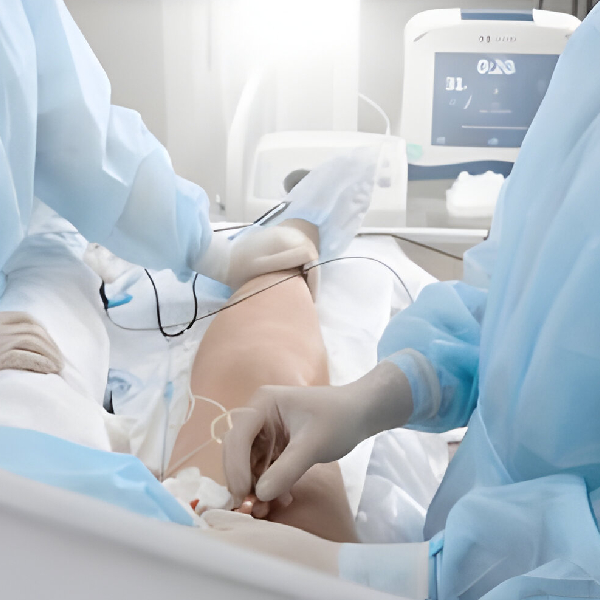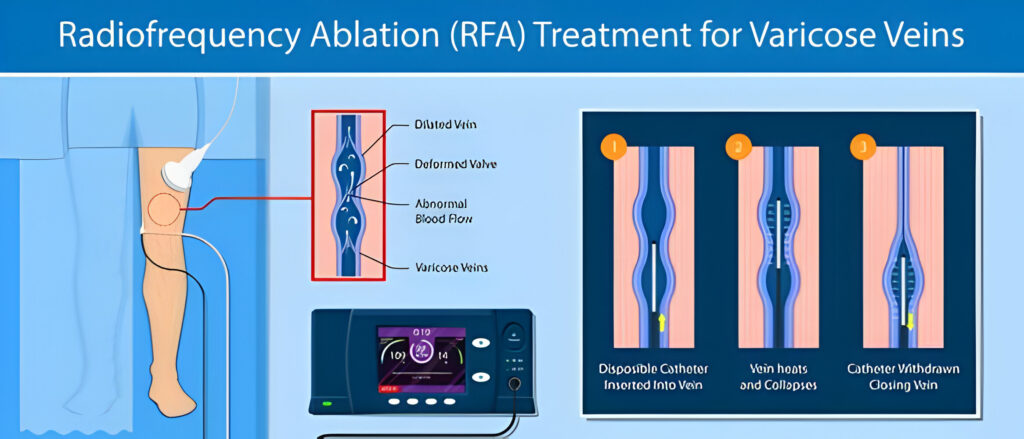R
e
l
e
v
i
u
m
Radiofrequency Ablation for Veins
What are the Main Advantages of Radiofrequency Ablation (RFA)?
Radiofrequency ablation (RFA) offers several key benefits:
- Quick, non-surgical process: RFA is a swift procedure that does not require surgery.
- FDA endorsement: This treatment is approved by the FDA, ensuring its safety and efficacy.
- Coverage by Medicare and most health insurance programs: RFA is typically covered by Medicare and the majority of other health insurance plans.
- No need for general anesthesia: Unlike surgical procedures, RFA does not require general anesthesia.
- No stitches: RFA is a minimally invasive procedure that does not involve stitches.
- Minimal discomfort: Patients usually experience minimal discomfort during and after the procedure.
- Very little downtime: RFA typically requires minimal downtime, allowing patients to resume their normal activities shortly after treatment.


Radiofrequency Ablation at Relevium in New Jersey
Varicose veins are often hereditary and can cause chronic pain, swelling, and other issues. At Relevium in New Jersey, we offer radiofrequency ablation as a contemporary treatment option for patients with varicose veins. This therapy effectively addresses the physical symptoms of venous insufficiency and enhances the appearance of the affected veins.
A Non-surgical Approach to Vein Removal
Traditionally, varicose veins were surgically removed through a process called stripping, which involved incisions and a lengthy recovery period. However, radiofrequency ablation provides a less invasive alternative. During RFA, a small catheter is precisely inserted into the vein under ultrasound guidance. The catheter delivers radiofrequency energy, causing the vein to contract and close.
The Procedure and Recovery
Radiofrequency ablation typically takes less than an hour and is performed on an outpatient basis. Local anesthesia is usually the only numbing agent required, and patients can usually return to their regular activities the same day. However, wearing compression stockings for at least a week following the procedure is recommended. Symptoms typically improve within a few days, with a high success rate of over 91% of treated veins remaining sealed after five years.
Comparing RFA with Laser Ablation
Radiofrequency ablation differs from laser ablation in that it uses a catheter to deliver thermal energy to the vein, causing it to close. Laser ablation, on the other hand, involves heating the vein using a laser filament, which can result in more pain, bruising, and discomfort.
Ideal Candidates for Radiofrequency Ablation
Radiofrequency ablation is suitable for individuals with troublesome varicose veins experiencing symptoms such as leg pain, swelling, and discomfort. The procedure is guided by ultrasound imaging, and a local anesthetic is applied to the treatment area to minimize discomfort.
Insurance Coverage and Recovery
Treatment with radiofrequency ablation is typically covered by insurance, and patients can expect to resume normal activities immediately following the procedure. Mild discomfort and bruising along the treated vein may occur but usually resolve within 1 to 2 weeks.
Potential Side Effects
Some patients may experience sensations such as tightness or pulling, as well as inflammation and skin discoloration near the treated vein. These side effects are usually temporary and resolve over time.
Convenient Online Booking for a Seamless Experience
Schedule Your Next Appointment with Ease
Go To Top

